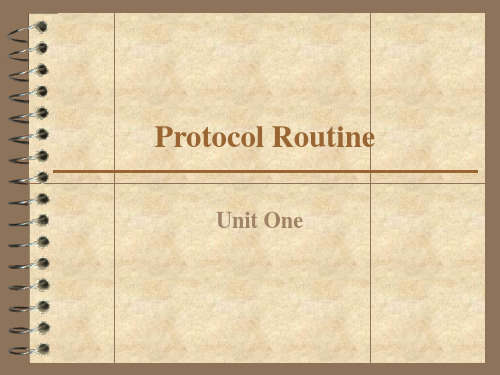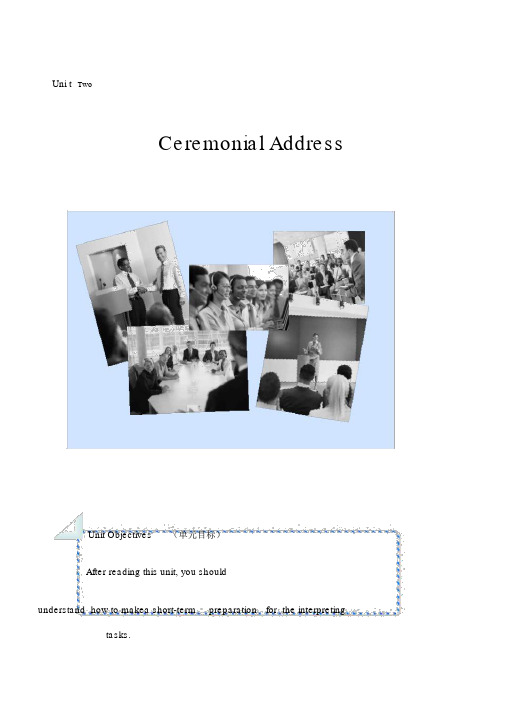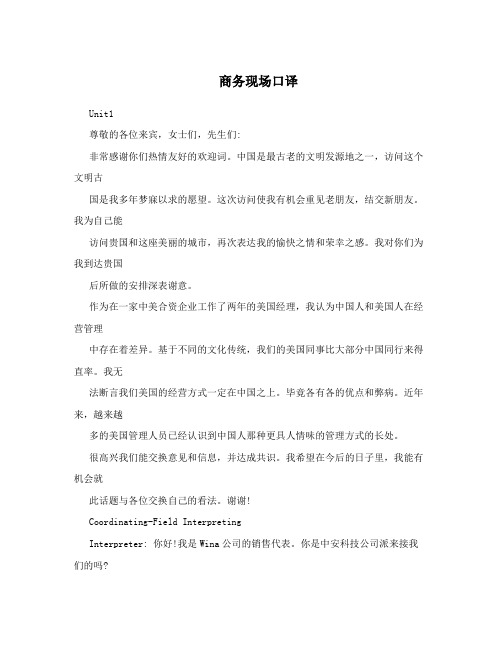商务现场口译第一单元
商务现场口译 unit 1

Preparing --Sentences Interpreting
A.
English to Chinese 我代表中国政府和人民,并以我个人的名义,向贵 国人民致以亲切的问候和良好的祝愿. 今天,我们怀着极为兴奋的心情,在这里集会,欢 迎来自英国ABC公司的布朗先生. 这使我有极好的机会来拜访老朋友,结交新朋友. 我们要离开贵国深感遗憾.说真的,这次访问非常 有意义,非常有收获. 能接待你们,我们感到很高兴.我们衷心感谢你们 的光临.
Preparing --Warm-up Exercises
How do you usually prepare for a reception task? Is preparation necessary in interpreting? Why/Why not? What and how shall an interpreter prepare for a reception-interpreting task? What kind of interpreting skills do you think an interpreter should master?
Assignment --Simulation Exercises
Work in groups. Role-play the following situations with your partners, acting as the Chinese speaker, English speaker and the interpreter respectively. One group will be invited to perform in class.
1.
2. 3. 4. 5.
商务现场口译答案16

商务现场口译答案16商务现场口译答案16【篇一:商务现场口译答案1-8单元】rase-interpretinga 1. to have a population of...2. to cover an area of...3. to date back to...4. to have a history of...5. to be situated in...6. the gross domestic product7. drive-in restaurant 8. quarantine certificate 9. duration of stay10. residence permit1.有……人口 2.有……面积 3.追溯到……4.有……年的历史 5.位于…… 6.国内生产总值7.“免下车”餐厅 8.检疫证书 9.居留期限10.居住证b.1.日程安排 2.旅行路线 3.起飞时间4.机场大楼 5.候机室6.贵宾室 7.问讯处 8.安全检查 9.免税店 10.个人物品1. schedule2. itinerary3. departure time4. terminal building5. departure lounge6. vip room7. information desk 8. security check 9. duty-free shop10. personal effects sentence interpretinga1. i believe youre going out of your way for us.2. wouldnt you like to spend an extra day or two here?3. im afraid that wont be possible, much as wed like to.4. i wonder if it is possible to arrange shopping for us.5. i will keep you posted.1.我相信这是对我们的特殊照顾了。
商务现场口译unit

Uni t TwoCeremonial AddressUnit Objectives(单元目标)After reading this unit, you shouldunderstand how to makea short-term preparation for the interpreting tasks.find ways to improve your interpreting skills and performance.master the basic words and expressions about ceremonial address.know some cultural background knowledge about ceremonial address.I. Interpreting Skills( 口译技能 )Read the following presentation about short-term preparation.Try tounderstand what and how to prepare for the interpreting tasks in theshort run. Then complete the following task:Suppose you are going to work as an interpreter for a businessman whois going to make a ceremonial address. How are you going to preparefor it and what questions are you going to ask if you are able to contactthe organizer or the speaker before the interpretation starts? Workin groups and work out a question list.Preparing Training (II): Short-term Preparation(短期准备)Short-term preparation in interpreting refers to the job that can only beprepared shortly before the interpreting task is taken. In contrast with long-termpreparation,short-term preparation is more direct and concrete,as each interpreting task is different from one another. The interpreter works for different speakers and on different subjects. In real interpreting situations,pre-interpreting preparation is usually referred to as short-term preparation.What to Prepare?After an interpreter has accepted an interpreting assignment, they shall start to prepare for the task immediately. Following are the essential items that theinterpreter shall prepare.1. Meeting DocumentsThe meeting documents are a great help to the interpreters. It is advisable for interpreters to ask the organizer to provide the complete documentation(文件) and background information for the task as early as possible, such as the meeting schedule (时间表) , list of participants(参加者), introduction of the keynotespeakers (主题发言人) etc. He must try to understand“who is the speaker? whatis the subject?what is the occasion? who is the audience? and what type of speech is it?” .2. A Glossary ListAfter getting the documents, the interpreter is then able to know the topics and subjects he is going to deal with. At this time, an experienced interpreterwill work out a list of glossary and terminology (术语)he will potentially encounterin interpreting. A prepared glossary list sometimes helps the interpreter out when he comes across new words.3. Dictionaries, Notebooks and PensInterpreting is often done in an uncertain situation. There are always somewords and expressions beyond the interpreter ’s mind and preparation.In this case, some classified dictionaries(分类词典) may be of great help. An experienced interpreter always brings certain dictionaries, which they can consult wheneverpossible. In addition, note-books and pens are also necessary in interpreting. As interpreters usually take notes in interpreting, two top-opening notebooks(竖翻式笔记本)and knock-gell pens(按压式水笔)are therefore recommended for interpreters to carry.Such note books and pens are easily handled in interpreting situations.4. Dresses and Name CardsIn addition, interpreters should know the general dress code(着装要求) before the meeting starts. Interpreters are always expected to dress appropriately andbehave respectfully when they attend the meeting. Moreover, business cards(名片) are also necessary as interpreters sometimes receive name cards from theorganizer and the speakers. Therefore, interpreters should prepare their own cards to offer them in return. Otherwise, it would make them embarrassed.How to Prepare?The following three ways are suggested that interpreter do when making short-term pre-interpreting preparation.1. Read through the Relevant DocumentsBefore an interpreter begins to work, he should read through the documents heis able to obtain and organize all the documents in an easily recognizable way sothat he can find them immediately when the speaker is delivering his speech. Ifhe has translated some of the texts beforehand, he should also classify the translated texts and put them in order.2. Surf the InternetThere is plenty of information in Internet. By surfing the net, the interpreter may find some important information that is related to the interpreting tasks,such as the background of the key-note speakers; the introduction to the related organizations etc.. It is suggested that interpreters find an Internet access and make full use of it.3. Contact the Organizer and the SpeakerBriefings(碰头会)are potentially a very useful part of advance preparation. They are meetings organized for the interpreter, with the participation of theorganizer and the speakers. At the briefing, the interpreter can ask specificquestions and get some general information. Sometimes, some speakers have strong accents. If possible, interpreters should attempt chance to talk personally withsuch participants before the real task begins so as to be familiar with their accents and improve the accuracy of the interpretation.4. Prepare a question listBefore taking the interview with the organizer and the speaker, interpretersare supposed to prepare a question list(提问单)in advance, as both the organizer and the speaker are usually rather busy. The questions must be to the point. Aprepared question list will be of great help during the interviews. Following isa sample question list:A Sample Question ListTo Organizer:1.May I have the schedule? Will there be any changes about the schedule?2. Is it possible for me to have the speakers’ speech drafts or ppt slides?3.Who will attend the conference? Is there a Q & A session?4.Who are the key-note speakers? How can I get in touch with them?To Speaker:1.How long will the speech last?2.What are your main points? Are you going to add or cut any points?3.Are you going to use any technical terms?4.May I have your draft or ppt slides?II. Phrase Interpreting( 短语口译 )Work on the following words and phrases. Interpret them into Chineseand English respectively.A.English to Chinese1.Take this opportunity2. Cherish3.Signing ceremony4. Witness5.Extend sincere thanks to⋯.6. Appreciatest but not least8. Enhance9.At his earliest convenience10. WorkshopB. Chinese to English1、司仪2、嘉宾3、值此⋯⋯之际4、友好使者5、良好祝愿6、衷心感谢7、热情好客8、应⋯⋯的邀请9、代表10、无以伦比的III.Sentence Interpreting(句子口译)Work on the following sentences. Interpret them into Chinese andEnglish respectively.A.English to Chinese1.I feel honored to come here on my first visit to your beautiful city.2.I would like to take this opportunity to extend our sincere thanks to ourhost for their earnest invitation and the gracious hospitality.3.Although there is a distance of tens of thousands of miles between us, "Longdistances separate no bosom friends", as one of your Tang poets once said.4.I greatly cherish thevalue the position wepartners. close relationship between our two cities.I also greatly enjoy as one of your most important trading5.On behalf of the foreign guests attending this workshop, let me offer a mostsincere “thank you ” for you warm and gracious welcome.B.Chinese to English1、我代表中国政府和人民,并以我个人的名义,向贵国人民致以亲切的问候和良好的祝愿。
商务现场口译

商务现场口译Unit1尊敬的各位来宾,女士们,先生们:非常感谢你们热情友好的欢迎词。
中国是最古老的文明发源地之一,访问这个文明古国是我多年梦寐以求的愿望。
这次访问使我有机会重见老朋友,结交新朋友。
我为自己能访问贵国和这座美丽的城市,再次表达我的愉快之情和荣幸之感。
我对你们为我到达贵国后所做的安排深表谢意。
作为在一家中美合资企业工作了两年的美国经理,我认为中国人和美国人在经营管理中存在着差异。
基于不同的文化传统,我们的美国同事比大部分中国同行来得直率。
我无法断言我们美国的经营方式一定在中国之上。
毕竟各有各的优点和弊病。
近年来,越来越多的美国管理人员已经认识到中国人那种更具人情味的管理方式的长处。
很高兴我们能交换意见和信息,并达成共识。
我希望在今后的日子里,我能有机会就此话题与各位交换自己的看法。
谢谢!Coordinating-Field InterpretingInterpreter: 你好!我是Wina公司的销售代表。
你是中安科技公司派来接我们的吗?Interpreter: Hi, Mr. Anderson! Yes, I am. My name is Li Hua from the InternationalBusiness Department of Zhong'an. Welcome to Shenzhen.Interpreter: 谢谢!Interpreter: Have you claimed all your luggage?Interpreter:全取了。
Interpreter: Then this way please. My car is in the parking lot across the street. Shall we gothere now?Interpreter:好的。
Interpreter: Did you have a good flight? Did you fly directly from Vancouver to Shenzhen? Interpreter:谢谢,是的。
大学核心商务英语口译教程unit (1)

• 第六段-3:The US is the second largest export market of China and its sixth largest source of import, while China is the third largest export destination and the biggest import source of the US, and has been the fastest growing major export market of the US for 7 years in a row.
• 第二段-1:As Vice Minister of Commerce in charge of high-tech trade and export control, I am deeply aware of the significance of this job. Mutual trust is the key to and communication the basis for expanding hightech trade between China and the US.
• 第六段-2:According to Chinese figures, bilateral trade in goods reached US$ 333.7 billion in 2008, quadrupling that of 2001 with an average annual growth rate of 19.5%. The US export to China stood at US$ 81.5 billion, trebling that of 2001 with an average annual growth rate of 15.2%. The two countries are each other’s second largest trading partner.
商务现场口译1复习题.doc

《商务现场口译1》复习题一、汉译英我们公司打算以削价的方式处理库存商品。
如果贵公司订购超过30000美元,我们将提供九折优惠。
Our company is planning to dispose of the stocks at a discount.If your company places an order for more than US$30,000, we will allow you a 10% discount.我们公司一直谋求在河南发展业务,希望开拓新的市场。
如果你们能预付现金,我们可以把价格降到100美元。
Our company has been expanding our business into Heenan in order to develop a new market.If you make cash payment in advance, we can drop the price to 100 US dollars・我们可以为你们公司建设网站,介绍你们的主耍产品。
货款需在40天内付清,预付现金可获3%折扣。
We can build a website for your company, with descriptions of your major products.We require full payment within 40 days, with a 3% discount for cash payment in advance・我们公司拥有最好的系列产品,并致力于提供优质服务。
由于我们商定的交货FI期已过,请告诉我们确切的装运H期。
Our company has the best product line and is dedicated to quality service・Since the agreed delivery date has passed, please tell us the exact shipping date.很抱歉,我们刚刚发了一大批货,目前没有存货了。
商务现场口译答案16
商务现场口译答案16【篇一:商务现场口译答案1-8单元】rase-interpretinga 1. to have a population of...2. to cover an area of...3. to date back to...4. to have a history of...5. to be situated in...6. the gross domestic product7. drive-in restaurant 8. quarantine certificate 9. duration of stay10. residence permit1.有……人口 2.有……面积 3.追溯到……4.有……年的历史 5.位于…… 6.国内生产总值7.“免下车”餐厅 8.检疫证书 9.居留期限10.居住证b.1.日程安排 2.旅行路线 3.起飞时间4.机场大楼 5.候机室6.贵宾室 7.问讯处 8.安全检查 9.免税店 10.个人物品1. schedule2. itinerary3. departure time4. terminal building5. departure lounge6. vip room7. information desk 8. security check 9. duty-free shop10. personal effects sentence interpretinga1. i believe youre going out of your way for us.2. wouldnt you like to spend an extra day or two here?3. im afraid that wont be possible, much as wed like to.4. i wonder if it is possible to arrange shopping for us.5. i will keep you posted.1.我相信这是对我们的特殊照顾了。
商务现场口译unit
U n i t T w oC e r e m o n i a l A d d r e s sUnit Objectives (单元目标)After reading this unit, you should➢understand how to make a short-term preparation for the interpreting tasks.➢find ways to improve your interpreting skills and performance.➢master the basic words and expressions about ceremonial address.➢know some cultural background knowledge about ceremonial address.I. Interpreting Skills (口译技能)Read the following presentation about short-termpreparation. Try to understand what and how to preparefor the interpreting tasks in the short run. Thencomplete the following task:Suppose you are going to work as an interpreter for abusinessman who is going to make a ceremonial address.How are you going to prepare for it and what questions areyou going to ask if you are able to contact the organizer orthe speaker before the interpretation starts? Work in groupsand work out a question list.Preparing Training (II): Short-term Preparation(短期准备)Short-term preparation in interpreting refers to the job that can only be prepared shortly before the interpreting task is taken. In contrast with long-term preparation,short-term preparation is more direct and concrete, as each interpreting task is different from one another. The interpreter works for different speakers and on different subjects. In real interpreting situations, pre-interpreting preparation is usually referred to as short-term preparation.What to Prepare?After an interpreter has accepted an interpreting assignment, theyshall start to prepare for the task immediately. Following are theessential items that the interpreter shall prepare.1. Meeting DocumentsThe meeting documents are a great help to the interpreters. It isadvisable for interpreters to ask the organizer to provide the completedocumentation(文件)and background information for the task as earlyas possible, such as the meeting schedule(时间表), list of participants(参加者), introduction of the keynote speakers(主题发言人)etc. Hemust try to understand “who is the speaker? what is the subject? whatis the occasion? who is the audience? and what type of speech is it?”.2. A Glossary ListAfter getting the documents, the interpreter is then able to knowthe topics and subjects he is going to deal with. At this time, anexperienced interpreter will work out a list of glossary and terminology(术语)he will potentially encounter in interpreting. A preparedglossary list sometimes helps the interpreter out when he comes acrossnew words.3. Dictionaries, Notebooks and PensInterpreting is often done in an uncertain situation. There are always some words and expressions beyond the interpreter’s mind and preparation. In this case, some classified dictionaries(分类词典)may be of great help. An experienced interpreter always brings certain dictionaries, which they can consult whenever possible. In addition, note-books and pens are also necessary in interpreting. As interpreters usually take notes in interpreting, two top-opening notebooks(竖翻式笔记本)and knock-gell pens(按压式水笔)are therefore recommended for interpreters to carry. Such note books and pens are easily handled in interpreting situations.4. Dresses and Name CardsIn addition, interpreters should know the general dress code(着装要求)before the meeting starts. Interpreters are always expected to dress appropriately and behave respectfully when they attend the meeting. Moreover, business cards(名片)are also necessary as interpreters sometimes receive name cards from the organizer and the speakers. Therefore, interpreters should prepare their own cards to offer them in return. Otherwise, it would make them embarrassed.How to Prepare?The following three ways are suggested that interpreter do when making short-term pre-interpreting preparation.1. Read through the Relevant DocumentsBefore an interpreter begins to work, he should read through thedocuments he is able to obtain and organize all the documents in an easily recognizable way so that he can find them immediately when the speaker is delivering his speech. If he has translated some of the texts beforehand, he should also classify the translated texts and put them in order.2. Surf the InternetThere is plenty of information in Internet. By surfing the net, the interpreter may find some important information that is related to the interpreting tasks, such as the background of the key-note speakers; the introduction to the related organizations etc.. It is suggested that interpreters find an Internet access and make full use of it.3. Contact the Organizer and the SpeakerBriefings(碰头会)are potentially a very useful part of advance preparation. They are meetings organized for the interpreter, with the participation of the organizer and the speakers. At the briefing, the interpreter can ask specific questions and get some general information. Sometimes, some speakers have strong accents. If possible, interpreters should attempt chance to talk personally with such participants before the real task begins so as to be familiar with their accents and improve the accuracy of the interpretation.4. Prepare a question listBefore taking the interview with the organizer and the speaker, interpreters are supposed to prepare a question list(提问单)in advance, as both the organizer and the speaker are usually rather busy. The questions must be to the point. A prepared question list will be of great help during the interviews. Following is a sample question list:A Sample Question ListTo Organizer:1.May I have the schedule? Will there be any changes about theschedule?2.Is it possible for me to have the speakers’ speech drafts or pptslides?3.Who will attend the conference? Is there a Q & A session?4.Who are the key-note speakers? How can I get in touch with them?To Speaker:1.How long will the speech last?2.What are your main points? Are you going to add or cut any points?3.Are you going to use any technical terms?4.May I have your draft or ppt slides?II. Phrase Interpreting (短语口译)Work on the following words and phrases. Interpretthem into Chinese and English respectively.A. English to Chinese1. Take this opportunity2. Cherish3. Signing ceremony4. Witness5. Extend sincere thanks to….6. Appreciate7. Last but not least 8. Enhance9. At his earliest convenience 10. WorkshopB. Chinese to English1、司仪2、嘉宾3、值此……之际4、友好使者5、良好祝愿6、衷心感谢7、热情好客 8、应……的邀请9、代表 10、无以伦比的III. Sentence Interpreting (句子口译)Work on the following sentences. Interpret them intoChinese and English respectively.A.English to Chinese1. I feel honored to come here on my first visit to your beautiful city.2.I would like to take this opportunity to extend our sincere thanksto our host for their earnest invitation and the gracious hospitality.3. Although there is a distance of tens of thousands of miles betweenus, "Long distances separate no bosom friends", as one of your Tang poets once said.4. I greatly cherish the close relationship between our two cities.I also greatly value the position we enjoy as one of yourmost important trading partners.5. On behalf of the foreign guests attending this workshop, let meoffer a most sincere “thank you” for you warm and gracious welcome. B.Chinese to English1、我代表中国政府和人民,并以我个人的名义,向贵国人民致以亲切的问候和良好的祝愿。
商务现场口译答案单元
商务现场口译答案单元 Company number【1089WT-1898YT-1W8CB-9UUT-92108】商务现场口译答案1—18单元 ( 全 )Unit1Phrase InterpretingA1. to recover from the jet lag2.thoughtful arrangement3. hospitality4. souvenir5. accommodations6. to claim baggage7. to proceed through the Customs 8. itinerary 9. farewell speech 10. to adjust to the time difference1.倒时差 2.周到的安排 3.热情好客 4.纪念品5.食宿6.提取行李 7.进行海关检查 8.活动安排 9.告别词10.适应时差B1.为……设宴洗尘 2.向……告别 3.不远万里来到… 4.很荣幸……5.久仰大名 6.欢迎词 7.赞美 8.回顾过去 9.展望未来10.美好回忆1. to hold a banquet in honor of...2. to bid farewell to...3. to come all the way to...4. tobe/feel honored...5. I have long been looking forward to meeting you.6. a welcoming address7. to pay tribute to 8. to look back9. to look ahead 10. happy memoryDistinguished Guests, Ladies and Gentlemen,Thank you very much for your gracious welcoming speech. China is one of the earliestcradles of civilization and the visit to this ancient nation has long been my dream. This visitwill give me an excellent opportunity to meet old friends and establish new contacts. I wishto say again that I am so delighted and privileged to visit your great country and this lovelytown. I am deeply grateful for everything you have done for me since my arrival in China.As an American manager of a Sino-American joint venture for two years, I have to saythat there are differences in business management practice between Chinese and Americans.We are more direct and straightforward than most Chinese colleagues due to our differentcultural traditions. I can't say our way of doing business is absolutely superior. After all,there are strong points and weak points in both types of management. In recent years, moreand more American business executives have recognized the strong points of the more humaneway of Chinese management.It is a great pleasure that I can exchange views and information with you, and reachcommon ground here. And I wish to share with you my thoughts on this topic in the days tocome. Thank you!尊敬的各位来宾,女士们,先生们:非常感谢你们热情友好的欢迎词。
商务现场口译答案 (全部)
Unit 7I.Listen to a short passage "Shopping for Clothes" carefully and note down what you hear. Try to use some symbols and abbreviations when you are taking notes. Then interpret your notes in the target language.Shopping for ClothesShopping for clothes is not the same experience for a man as it is for a woman. A man goes shopping because he needs something. His purpose is settled and decided in advance. He knows what he wants, and his objective is to find it and buy it; the price is a secondary consideration. All men simply walk into a shop and ask the assistant for what they want. If the shop has it in stock, the salesman promptly produces it, and the business of trying it on proceeds at once. All being well, the deal can be and often is completed in less than five minutes, with hardly any chat and to everyone's satisfaction. For a man, slight problems may begin when the shop does not have what he wants, or does not have exactly what he wants.Now how does a woman go about buying clothes? In almost every respect she does so in the opposite way. Her shopping is not often based on needs. She has never fully made up her mind what she wants, and she is only "having a look round". She is always open to persuasion; indeed she sets great store by what the saleswoman tells her, even by what companions tell her. She will try on any number of things. Uppermost in her mind is the thought of finding something that everyone thinks suits her. Contrary to a lot of jokes, most women have an excellent sense of value when they buy clothes. They are always on the lookout for the unexpected bargain. Faced with a roomful of dresses, a woman may easily spend an hour going from one rail to another, to and fro, often retracing her steps before selecting the dresses she wants to try on. It is a laborious process, but apparently an enjoyable one. Most dress shops provide chairs for the waiting husbands.II. Phrase InterpretingA1. screen2. diagram3. vertical axis4. column5. in summary6. consequently7. furthermore 8. to run out of time 9. in a word10. in addition1.屏幕 2.图表 3.纵轴4.圆柱 5.总之 6.因此7.此外 8.没时间 9.总而言之10.另外B.1.商品特性 2.顺序 3.订单4.垄断 5.质量监控 6.利润7.制造业 8.服务业 9.运作10.顾客满意度1. commodity features2. sequence3. order4. monopoly5. quality control6. profit7. manufacturing industry 8. service industry9. operation 10. degree of customer satisfactionIII. Sentence InterpretingA.1. Please proceed with your presentation.2. This morning I'm going to describe sales forecasts for the European computer market over the next five years.3. Good afternoon, everyone. This afternoon I'd like to describe briefly the advantages of using the TEC-NET communication service.4. In summary, ladies and gentlemen, as well as providing extensive after-sales service, Minimax will be happy to custom-design our product to meet the needs of your company.5. At the end of the presentation there will be time for any questions you have.1.请开始你的简要汇报。
